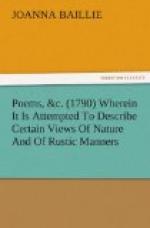The gilded mots in mazy circles play,
And sleepy Comrade in the sun is laid,
More grateful to the cur than neighb’ring shade;
In snowy shirt unbrac’d, brown Robin stood,
And leant upon his flail in thoughtful mood:
His full round cheek where deeper flushes glow,
The dewy drops which glisten on his brow;
His dark cropt pate that erst at church or fair,
So smooth and silky, shew’d his morning’s care,
Which all uncouth in matted locks combin’d,
Now, ends erect, defies the ruffling wind;
His neck-band loose, and hosen rumpled low,
A careful lad, nor slack at labour shew.
Nor scraping chickens chirping ’mongst the straw,
Nor croaking rook o’er-head, nor chatt’ring daw;
Loud-breathing cow amongst the rampy weeds,
Nor grunting sow that in the furrow feeds;
Nor sudden breeze that shakes the quaking leaves,
And lightly rustles thro’ the scatter’d sheaves;
Nor floating straw that skims athwart his nose,
The deeply musing youth may discompose.
For Nelly fair, and blythest village maid,
Whose tuneful voice beneath the hedge-row shade,
At early milking, o’er the meadows born,
E’er cheer’d the ploughman’s toil at rising morn:
The neatest maid that e’er, in linen gown,
Bore cream and butter to the market town:
The tightest lass, that with untutor’d air
E’er footed ale-house floor at wake or fair,
Since Easter last had Robin’s heart possest,
And many a time disturb’d his nightly rest.
Full oft’ returning from the loosen’d plough,
He slack’d his pace, and knit his thoughtful brow;
And oft’ ere half his thresher’s talk was o’er,
Would muse, with arms across, at cooling door:
His mind thus bent, with downcast eyes he stood,
And leant upon his flail in thoughtful mood.
His soul o’er many a soft rememb’rance ran,
And, mutt’ring to himself, the youth began.
“Ah! happy is the man whose early lot
Hath made him master of a furnish’d cot;
Who trains the vine that round his window grows,
And after setting sun his garden hoes;
Whose wattled pales his own enclosure shield,
Who toils not daily in another’s field.
Where’er he goes, to church or market town,
With more respect he and his dog are known:
A brisker face he wears at wake or fair,
Nor views with longing eyes the pedlar’s ware,
But buys at will or ribands, gloves, or beads,
And willing maidens to the ale-house leads:
And, Oh! secure from toils which cumber life,
He makes the maid he loves an easy wife.
Ah, Nelly! can’st thou with contented mind,
Become the help-mate of a lab’ring hind,
And share his lot, whate’er the chances be,
Who hath no dow’r, but love, to fix on thee?
Yes, gayest maid may meekest matron prove,
And things of little note may ’token love.
When from the church thou cam’st at eventide
And I and red-hair’d Susan by thy side,
I pull’d the blossoms from the bending tree,




